The NFL's final four looked exciting on paper and delivered in real life on Sunday. It was the first time in NFL history both conference championship games went to overtime, which was almost an afterthought given how much these two games crammed into regulation. The Patriots and Chiefs had four lead changes in a 38-point fourth quarter. The Rams battled back to tie the Saints twice and didn't lead until Greg Zuerlein hit a 57-yarder to win the game in the extra period.
There's a lot to get to in discussing these games. There are moments you've forgotten in light of what happened afterward, and I say that because I forgot them before I started looking through my notes, too.
Let's run through 16 key moments from Sunday's games and try to get a sense of what actually happened during a furious day of football:
Jump to a matchup:
NE 37, KC 31 | LAR 26, NO 23

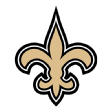
The no-call on Nickell Robey-Coleman
Situation: third-and-10 on the Rams' 13, 1:49 left in the fourth quarter
Score: tied at 20
I have to start with the most agonizingly frustrating moment of the day. You've probably seen the play by now. I don't need to tell you that it was pass interference. It's an absolutely brutal missed call from a crew that seemed allergic to making big calls. The refs already had missed a would-be pass interference call on Robey-Coleman on a prior third-and-7 against Ted Ginn Jr. that would have extended a Saints drive on Los Angeles' side of the field in the fourth quarter.
When we see key pass interference calls, the usual conversation is about how we need to fix the pass interference rule itself. That's not the case here. The rule was fine, but it simply wasn't applied properly. ESPN's Kevin Seifert wrote that pass interference should become a reviewable call, and I wouldn't be opposed to that idea. By all rights, the Saints should have been given the ball in a first-and-goal situation, where they could have drained the clock and kicked a field goal to take the lead with about 12 seconds left on the clock. Instead, well, you saw what happened.
Did the no-call cost the Saints the game? In the context of that one play, yes. In the broader context of that drive and what happened next, though, I think the Saints didn't do themselves any favors. After Drew Brees lofted up a prayer to Ginn for a 43-yard gain over Lamarcus Joyner to get the Saints into the red zone, they stood over the ball with 1:58 left to go on the Los Angeles 13-yard line and the Rams holding two timeouts. Had they run the ball three times without gaining a first down, the Saints would have attempted a gimme field goal with about one minute to go. The Rams would have needed to drive into field goal range without any timeouts.
Instead, the Saints threw the ball twice, as the third-down pass to Lewis was preceded by a first-down slant to Michael Thomas on a pick play New Orleans loves to run. It's a mildly contrarian call from Sean Payton in a moment in which everyone is typically expecting a run, given that it has a high chance of being completed while keeping the clock running. Brees missed the throw, putting the ball too low. I understand the playcall, and in most cases, I love when coaches are aggressive. I'm not as sure about this one. Brees should have been bailed out by the pass interference call, but when he wasn't, the Saints left the door wide-open for the Rams to come back.
Tom Jackson and Keyshawn Johnson break down what makes the Patriots such a successful franchise.
That's exactly what happened, and while the pass interference non-call was awful and the decision to throw on first down was at least defensible, the Saints didn't get the job done after the field goal. They let Jared Goff drive 45 yards downfield in less than a minute. If anything, they were lucky to get to overtime, given that the Saints badly blew a coverage against a stacked set of receivers and allowed Goff to hit a wide-open Robert Woods, who stumbled and was limited to 16 yards. Had Woods been upright and caught the ball without breaking stride, he might have scored a touchdown.
In overtime, the Saints even won the coin toss and got the ball first, only to seem shell-shocked. They moved the ball with a pass interference call, but Mark Ingram was spun backward for a loss of 6 yards before Brees was hit in the middle of his motion and picked off by John Johnson III. The Rams then converted two passes to Tyler Higbee before Woods dropped a screen and Zuerlein hit a 57-yard field goal to send the Rams to the Super Bowl. As bad as the non-call against Robey-Coleman was, the Saints were still favorites to win after kicking the field goal in regulation and winning the coin toss in overtime. They weren't able to finish the job in either situation.
The Rams successfully execute a fake punt
Situation: fourth-and-5 on the Rams' 30-yard line, 14:23 left in the second quarter
Score: Saints lead 13-0
For the second week in a row, a team in the Superdome was able to spark its offense and extend a possession with a desperate fake punt in the first half. Last week, it was the Saints. This time, the fake punt went against the Saints, as Johnny Hekker hit Sam Shields with a 12-yard pass for Los Angeles' initial first-down conversion of the day. The Rams eventually drove into the red zone and hit a field goal for their first points of the game.
Last week, after Eagles coach Doug Pederson declined a holding penalty on the Saints on third down, giving New Orleans' offense a fourth-and-1 at its own 30, there was a public inquest into his decision-making. Didn't he know Payton loves to take chances? I'm not sure I have a strong opinion on that call either way, but if anyone should have realized that the Rams were inclined to call for a fake in a similar situation, shouldn't it have been Payton and his staff after doing the exact same thing a week earlier? Under the tutelage of John Fassel, Hekker has been one of the most aggressive and effective passers among punters in the league. The Saints weren't prepared, though, and while it required Shields to make Justin Hardee miss in the open field, Hekker had a relatively easy completion to the former Packers cornerback.
The Saints kick their second field goal in the red zone
Situation: fourth-and-4 on the Rams' 10-yard line, 7:10 to go in the first quarter
Score: Saints go up 6-0
The Saints probably should have been able to win Sunday's game before things ever came down to a missed call in the fourth quarter, but they were profligate in the red zone in the first quarter. After driving to the Rams' 19-yard line on their opening possession, the Saints called timeout before a third-and-7 snap. After the timeout, the Saints ran with three vertical routes and two underneath routes by Michael Thomas and Alvin Kamara. Brees decided to take a shot to backup tight end Dan Arnold, which seemed curious given that a throw to Arnold would draw double coverage while Brees had single matchups on the outside. The throw hit Arnold in the hands, but he dropped it and the Saints kicked a field goal. Here's the play, via NFL Next Gen Stats:
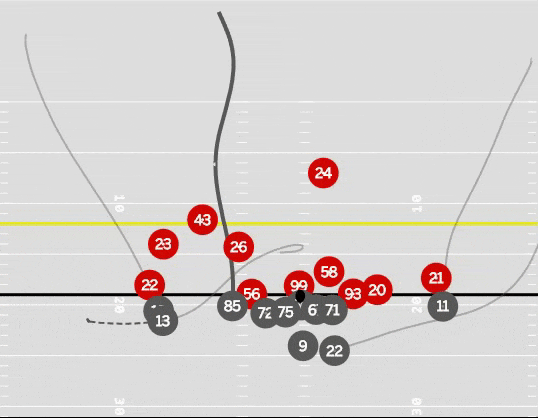
After Todd Gurley dropped a pass into Demario Davis' lap for an interception, the Saints took over for their second possession with the ball already in the red zone. They didn't do much. They ran two plays for 1 yard, then a quick throw to Alvin Kamara gained only 5, and the Saints kicked a field goal from the 10-yard line to go up 6-0. Would they have gone for it on fourth-and-2 or less? Maybe. While they came away with three points, the two early drives seemed reminiscent of the 2014 NFC Championship Game, when Mike McCarthy kicked two field goals inside 20 yards in the first half to go up 6-0. Payton faced a fourth-and-7 and a fourth-and-4, so I can't fault him in the same way for kicking, but the Saints didn't do enough to take advantage of their dominant play early in the game.
Later on, the Saints ended up stalling at midfield. The first missed pass interference call on Robey-Coleman forced them to punt on fourth-and-7 from the Rams' 47-yard line. On their next drive, after a hold on Terron Armstead, they punted on fourth-and-17 from their own 47-yard line. Last week, the Saints were able to pull out second- or third-and-long opportunities with throws to Thomas. This week, Brees actually had Ginn open to convert on third-and-17, but badly missed the throw and nearly had his pass intercepted by Robey-Coleman. If the Saints turn one of those early field goals into touchdowns or turn one of those drives at midfield into a field goal, they probably win this game.
Sean McVay kicks a field goal to tie the score
Situation: fourth-and-goal from the Saints' 1-yard line, 5:16 to go
Score: Rams tie the score at 20
This, on the other hand, was an inexcusably bad decision from the game's most promising young coach. The next time the Rams spend the entire week talking about how they're a physical football team built around running the football, as they did after beating the Cowboys last week, you can safely ignore that as bluster. Last week, on fourth-and-goal from the 1-yard line up eight points, the Rams inexplicably tried to draw the Cowboys offside and called a timeout before going for it and scoring a touchdown.
On Sunday, in a situation in which the math heavily favors going for it, McVay didn't trust his team to get a yard. As ESPN's Seth Walder noted, the Rams dropped their chances of winning from 55 percent to 43 percent by choosing to attempt a field goal. They should have attempted to go for it if they thought they had merely a 32 percent chance of converting from a yard out, which shouldn't be difficult given that Los Angeles converted in 68 percent of power situations this season.
Is the Rams' win proof that McVay made the right call? Absolutely not. To win this game, the Rams eventually needed to be bailed out by the awful missed pass interference call against Robey-Coleman, drive downfield to hit a game-tying field goal, stop the Saints on the first drive of overtime, and then hit a 57-yard field goal to win it. If they had scored a touchdown on that fourth-and-goal play -- and the odds were in their favor -- the Rams could have essentially won the game by stopping the Saints on a fourth-and-8 after the Robey-Coleman non-call.
McVay's timeout management and fourth-down decision-making has been a weakness for the Rams, and while they've advanced to the Super Bowl, he's going to be at a considerable disadvantage across the field from Belichick, who manages in-game situations about as well as anybody in football. McVay is an excellent coach, and obviously gets a lot of things right. He'll get better at managing games with experience but that experience might not help two weeks from now.
Gurley spends the third quarter stretching on the sideline
Score: Saints lead 20-17 entering the fourth quarter
It was a bizarre game for the Rams' star running back, who spent a second consecutive week serving as what amounted to a secondary back behind C.J. Anderson. A lesser back might have been benched for Gurley's first half, in which his drop resulted in Davis' interception and he whiffed on a pass block against Eli Apple. Gurley ran the ball in at the end of that subsequent drive for a 6-yard touchdown, but despite the score line, the Rams stuck with Anderson as their lead back.
The two backs split snaps, with Anderson getting 35 to Gurley's 32, but the former Broncos standout racked up 17 touches to Gurley's five. Gurley swore after the game that he was simply "sorry" and not injured, but it's hard to believe that the Rams have suddenly decided that a guy they signed off the street in December is worth playing ahead of a back who was taking 90-plus percent of the snaps when healthy. He finished the night posting a photoshop depicting himself exchanging jerseys with referee Bill Vinovich, which will likely earn him some sort of fine from the NFL.
Chris Berman, Keyshawn Johnson and Tom Jackson preview Super Bowl LIII, a battle between the young Rams and the seasoned Patriots.
Gurley's situation is going to be fascinating to figure out over the next two weeks. In a vacuum, the default game plan for the Patriots against the Rams in the Super Bowl would be to emulate Belichick's famous scheme in Super Bowl XXXVI against Marshall Faulk by hitting Gurley as often as possible and taking him out of the game. If Gurley is injured, though, should the Patriots be as concerned about stopping him? Can he get closer to 100 percent with two weeks of rest? Are the Rams better off going with Anderson as their primary back? And if that's true, what does it say about the decision to pay Gurley a premium based on how he performed last season?
Goff throws a swing pass to Brandin Cooks for 25 yards
Situation: second-and-3 from the Saints' 42-yard line, 5:15 left in the third quarter
Score: Saints lead 20-10
While the Rams have used play-action and motion across the formation to open up the defense for YAC opportunities for two years running, what made this swing pass to Cooks so interesting is the formation. This was one of 16 plays the Rams ran out of 12 personnel (one back, two tight ends), which pushed both Gerald Everett and Tyler Higbee onto the field at the same time. The Rams ran more than 31 percent of their offensive snaps out of 12 personnel, which was a marked change for a team that used 11 personnel (one back, one tight end) more than 91 percent of the time during the regular season, per the NFL's Next Gen Stats.
It's one thing to play off your tendencies and try something different in the postseason, but it's another to do it successfully. The Rams posted a 75 percent success rate out of 12 personnel on Sunday against just a 43 percent success rate out of their traditional 11 personnel. It's one thing to stick with 11 personnel when you have Cooper Kupp on the field, but with Kupp gone, the Rams might be better off with two tight ends on the field as opposed to Josh Reynolds, at least some of the time. It's something that will give the Patriots pause as they devise a game plan for the Super Bowl.
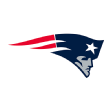
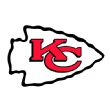
Tom Brady hits Rob Gronkowski for a 25-yard completion
Situation: third-and-5 on the Chiefs' 29-yard line, 54 seconds left in regulation
Score: Chiefs lead 28-24
In key moments, Brady is generally looking for one of two guys: Julian Edelman or Gronk, who was the target on a number of critical third downs late in this game. This play came after Brady attempted to go to Gronkowski on a third-and-10 pass that was intercepted before being brought back on an offsides call (more on that in a minute). The Patriots needed 5 yards in two plays and had all their timeouts, so it might have been reasonable to expect just about anything out of the Pats' playbook.
Most teams would have tried to move the chains with a high-percentage pass. Instead, Brady trusted his Hall of Fame tight end to make a play. The Patriots split out Gronkowski and saw that he was matched up against star Chiefs defensive back Eric Berry with a single-high safety in the middle of the field. Brady took his chances and threw a fade to Gronkowski, who outmuscled Berry at the line and brought in the football.
It was no surprise, given that Brady went to Gronkowski for two critical fourth-quarter catches in the regular-season matchup between these two teams, including a 39-yard reception on the final drive over Josh Shaw, who hadn't played on defense all season and has since been cut. The Chiefs didn't have Berry in that game, and it's unlikely that he's 100 percent, but they couldn't make the same excuse about a mismatch this time. In overtime, Brady moved the chains on a third-and-10 with a slant to Gronk against Berry to get the Patriots in the red zone. Three Rex Burkhead runs later, the Patriots were in the Super Bowl.
As for that offsides call, there was chatter on Twitter afterward that the call was unjust, given that Dee Ford was whistled for a neutral-zone infraction but drawn deeper into the line by left tackle Trent Brown, who wasn't on the line of scrimmage. That might very well be true, but it wouldn't have given the Chiefs their game-sealing interception back. Ford was offsides, and if Brown had been whistled for an illegal formation, the penalties would have offset and the Pats would have replayed third down. The Pats were incorrectly spotted 5 yards, but given that they threw a pass 20-plus yards downfield to Gronk on the ensuing third-and-5, I don't think it materially impacted the game.
Chris Jones is called for a phantom roughing the passer penalty
Situation: second-and-7 on the New England 28-yard line, 7:10 to go in the fourth quarter
Score: Chiefs lead 21-17
Well, this is awkward. Earlier this week, I wrote about how there isn't much evidence of Tom Brady getting a disproportionate number of roughing the passer calls. So, several days later, Brady ... gets a shaky roughing the passer call when the Chiefs defensive lineman appeared to hit Brady in the shoulder, only to be called for a blow to the head. Thanks, refs.
It was a terrible call. I'd also point out that it's the fourth time Brady has benefited from a roughing the passer call in 1,002 postseason dropbacks since returning from his torn ACL in 2009, which is one penalty for every 250.5 dropbacks. Teams like the Cardinals and Vikings have benefited from roughing the passer penalties more frequently over that same time frame, and the mark is right in line with the Pats' regular-season average since 2009 (224.5 dropbacks per roughing the passer call). It was a bad call, but it's also not representative of special treatment for Brady in the postseason, as much as that one play might suggest otherwise.
I'm bringing this one up more to talk about the absence of the Chiefs' pass rush, which ended up dooming their chances on Sunday night. Facing a front four that sacked opposing quarterbacks 41 times this season, Brady dropped back 48 times and wasn't sacked even once. He was knocked down on only one occasion and pressured on 10.9 percent of those pass plays, the lowest rate for any passer against the Chiefs this season. Brady helped by getting his passes out after an average of 2.51 seconds, the second-fastest rate against Kansas City this season. Jones played through a second-half injury, while the likes of Ford and Justin Houston simply didn't make their mark in the most important game the Chiefs have played in decades. It might very well have been Houston's final game in a Chiefs uniform.
Louis Riddick breaks down how the Patriots beat the Chiefs in the AFC Championship Game, citing Bill Belichick's coaching as a huge advantage.
The reality is that the Chiefs were gassed. With the Patriots dominating time of possession in the first half and holding the ball in overtime, they finished the game with 94 offensive plays to Kansas City's 47. As Chase Stuart pointed out on Twitter, this is reminiscent of the comeback victory over the Falcons in the Super Bowl, when the Patriots ran 93 plays to Atlanta's 47. As I noted at the time, the Falcons' pass rush was useful for most of the game before simply falling apart late in the contest. Here, while the Chiefs didn't do much with their rush for most of the game, they offered even less on the final few drives.
The Patriots win the overtime coin toss
Situation: beginning of overtime
Score: tied at 31
After Patrick Mahomes drove the Chiefs 48 yards on two plays to get into field goal range near the end of regulation, Andy Reid called for Mahomes to throw one pass downfield before Harrison Butker tied the game up with a 39-yard field goal. Mahomes never saw the field again, as the Patriots won the coin toss and then drove 75 yards for the game-winning touchdown. It was a cruel end to the season for the presumptive league MVP.
If you're a Chiefs fan, you're probably complaining about the league's overtime system this morning. I don't know that I agree. The Chiefs didn't manage to come up with a single stop in overtime, allowing the Pats to convert third-and-10 three different times. That's on Bob Sutton and the defense, not the coin toss. I think the old system of allowing teams to win on a field goal was probably too easy in a league with professional kickers, which is why I also don't love the college system of handing each team possession in what would already amount to pro field goal range.
I don't think the regular-season overtime rules should be changed. In the playoffs, while I think the current rule is fine, I think a more equitable solution would be to play out a full 15-minute fifth quarter in overtime unless one team gets a lead of nine points or more, at which point the game would end. In that scenario, the Chiefs would be guaranteed a possession, but if they were stopped, the Pats would be able to win with a field goal. If the score is tied at the end of the fifth quarter, then I think you go to sudden death with the next score of any kind winning the game.
Tom Brady throws an interception in the end zone to Reggie Ragland
Situation: third-and-goal on the Chiefs' 1-yard line, 13:45 to go in the second quarter
Score: Patriots lead 7-0
The Patriots had their own issues in turning early-game dominance into an unassailable lead, owing to an ill-timed Brady interception. The Pats picked on Kansas City's linebackers all game by stretching them with the run and throwing to James White and Rex Burkhead, but Ragland came up with a critical interception by immediately sniffing out a play-fake and sneaking into a throwing lane just in time to pick off a pass intended for Gronkowski. If Mahomes would have made that sort of pass, we would have blamed it on youthful exuberance and inexperience.
Instead, Brady was the one who was picked off in the red zone, which marked the sixth red zone interception for the future Hall of Famer on his 238th red zone pass attempt in his postseason career. It was too small of a window, and while Brady still has plenty of zip when he absolutely needs it, it was a bad decision given the game situation. It cost the Patriots a minimum of three points and possibly more, given that Belichick might very well have gone for it on the 1-yard line.
Brady would have a second interception later in the game bounce off of the hands of Edelman and into those of Chiefs safety Daniel Sorensen, who had come up with a big play earlier in the half ...
Sorensen stuffs Burkhead on fourth down
Situation: fourth-and-1 on the Chiefs' 25-yard line, 9:38 to go in the fourth quarter
Score: Patriots lead 17-14
Everyone said the same thing after the Patriots' running back was stuffed: Why didn't Brady just sneak the ball for a first down? I strongly suspect that Brady has the ability to get the ball and sneak on his own without having it called for him in the huddle, although he didn't appear to kill any sneak at the line before handing the ball to Burkhead, as he did on the subsequent fourth-and-1 touchdown run by Sony Michel.
The decision to go for it on fourth-and-1 was just fine. Was the playcall to hand the ball to Burkhead on an interior run a good idea? I think it's OK, and I also expect Brady had the ability to check out of it if he thought it wasn't going to work. The Patriots love rushing to the line and using outside zone in short-yardage near the goal line, and when they rushed up to the line here, it was fair to wonder whether that was going to be the playcall. The Pats had gashed the Chiefs on the ground all day, and 32 of their 35 carries had gained at least 1 yard, with none of their rushes losing yardage. To be fair, two of their three stuffs had come with Michel in short yardage, both on the second-and-goal run before the Ragland interception and on a third-and-1 at midfield. I'm willing to give the Pats the benefit of the doubt in their offensive decision-making.
The referees overturn Julian Edelman's muffed punt return
Situation: fourth-and-8 from the Chiefs' 27-yard line, 8:47 to go
Score: Patriots lead 17-14
This one ended up not mattering all that much when Brady threw the interception two plays later, but it was a flashpoint for the frustrating officiating day. I had half of my Twitter timeline saying that Edelman definitely touched the ball and the other half saying it didn't come anywhere near the Patriots' returner. Gene Steratore, calling the game for CBS, pieced together two replay angles to suggest that the ball conclusively had not touched Edelman on the thumbs. I also don't believe it touched Edelman, but I don't know that it was conclusive enough to justify overturning the call on the field.
Mahomes hits Sammy Watkins for a 38-yard completion
Situation: second-and-10 from the Patriots' 40-yard line, 2:54 to go
Score: Patriots lead 24-21
Had the Patriots lost, this play would have come under more scrutiny, because it was pretty clearly offensive pass interference. Both of these teams love pick plays, but you have to either design the play to at least give a pretense of avoiding the defender or have the pick come within 1 yard of the line of scrimmage. Watch the play and you'll see that the pick from Chris Conley clearly takes place 3 yards downfield. Belichick tried to show the refs afterward and was frustrated enough to take out his anger on his tablet.
J.C. Jackson commits pass interference on Watkins
Situation: second-and-10 from the Chiefs' 37-yard line, 3:07 to go
Score: Patriots lead 24-21
Two plays earlier, Jackson helped push the ball downfield with a critical defensive holding penalty. The Chiefs got plenty of calls in their favor in the second half, although they'll mostly be forgotten in the years to come as people remember the Edelman review and the Jones foul. I'm not saying that to suggest that the calls were unwarranted, just that they mattered.
Jackson was a mess in the second half. Kelce beat him on a skinny post for the Chiefs' first touchdown. He committed pass interference on a ball thrown behind Kelce in the end zone, took a holding penalty that wiped away a Kelce fumble, and then added a second pass interference call for 28 yards to push the Chiefs over midfield. The Patriots surprised the Chiefs by starting the game with an unexpected set of cornerback matchups. They stuck Jackson on Kelce, put All-Pro Stephon Gilmore on Watkins, and used a combination of Jonathan Jones and rookie seventh-rounder Keion Crossen on Tyreek Hill.
It worked during the first half, when Mahomes went 4-of-8 for 65 yards and took three sacks. It kept Hill out of the game, as the Chiefs' star wideout got open past Crossen on one deep play for 42 yards but had no other catches. The Chiefs adjusted and went to Watkins, who had one big play on a scramble drill past Gilmore and picked on lesser cornerbacks when the Patriots went away from Gilmore in the second half. He finished with 114 yards on eight targets. Kelce had a touchdown and drew that pass interference penalty, but he racked up only three catches for 23 yards amid double coverage.
The Chiefs were able to spring Kareem Hunt for big plays in the receiving game the previous two times these teams played, and without Hunt in this game, they were still able to create passing plays for their backs. Spencer Ware had a 21-yard catch late in the game, and Damien Williams racked up five catches for 66 yards and two touchdowns, along with a third as a runner. He should have had more ...
Mahomes misses a wide-open Williams for a touchdown
Situation: first-and-10 from the Patriots' 23-yard line, 4:42 left in the second quarter
Score: Patriots lead 7-0
In the regular-season matchup between these two teams, Mahomes missed Hunt going up the sideline on a wheel route for a touchdown. On Sunday, he did the exact same thing in the second quarter. The Chiefs executed a legal pick with Kelce at the line of scrimmage on Kyle Van Noy, and with Williams running a wheel route uncovered out of the backfield, this should have been an easy touchdown. Mahomes just missed the throw (via NFL Next Gen Stats):
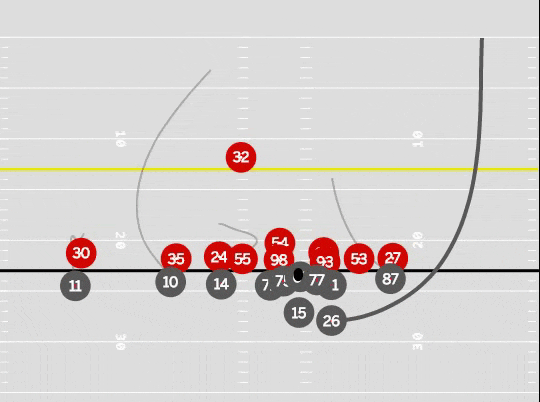
The drive should have produced a touchdown. Instead, after Mahomes took a huge sack on third down, the Chiefs were forced to punt.
Mahomes recovers a fumble at the end of the first half
Situation: first-and-10 from the Chiefs' 42-yard line, 21 seconds left in the second quarter
Score: Patriots lead 14-0
Mahomes quietly helped keep the Chiefs in a game with a fumble recovery that didn't seem like much at the time. After a long kickoff return, Reid threw Mahomes onto the field with 21 seconds left and two timeouts in the hopes of getting a throw into field goal range.
The second-year quarterback was immediately strip-sacked by Van Noy but tracked down the fumble and recovered it on his own 27-yard line. Had the Pats fallen on the football, they would have likely come away with three points. The rest of the game might have gone differently from there, but the Chiefs ended up needing those three points by the end of the night.
